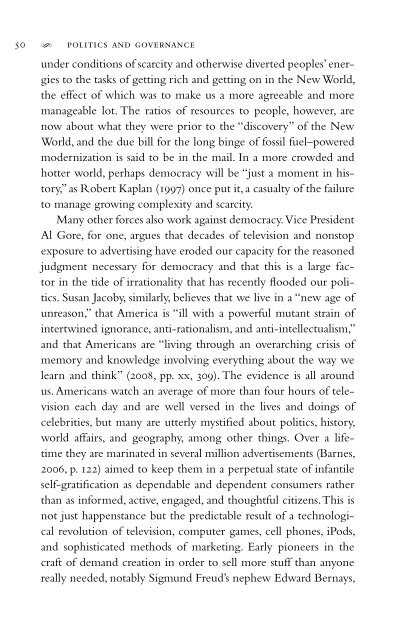Down to the wire : confronting climate collapse / David - Index of
Down to the wire : confronting climate collapse / David - Index of
Down to the wire : confronting climate collapse / David - Index of
You also want an ePaper? Increase the reach of your titles
YUMPU automatically turns print PDFs into web optimized ePapers that Google loves.
S<br />
50 politics and governance<br />
under conditions <strong>of</strong> scarcity and o<strong>the</strong>rwise diverted peoples’ energies<br />
<strong>to</strong> <strong>the</strong> tasks <strong>of</strong> getting rich and getting on in <strong>the</strong> New World,<br />
<strong>the</strong> effect <strong>of</strong> which was <strong>to</strong> make us a more agreeable and more<br />
manageable lot. The ratios <strong>of</strong> resources <strong>to</strong> people, however, are<br />
now about what <strong>the</strong>y were prior <strong>to</strong> <strong>the</strong> “discovery” <strong>of</strong> <strong>the</strong> New<br />
World, and <strong>the</strong> due bill for <strong>the</strong> long binge <strong>of</strong> fossil fuel–powered<br />
modernization is said <strong>to</strong> be in <strong>the</strong> mail. In a more crowded and<br />
hotter world, perhaps democracy will be “just a moment in his<strong>to</strong>ry,”<br />
as Robert Kaplan (1997) once put it, a casualty <strong>of</strong> <strong>the</strong> failure<br />
<strong>to</strong> manage growing complexity and scarcity.<br />
Many o<strong>the</strong>r forces also work against democracy. Vice President<br />
Al Gore, for one, argues that decades <strong>of</strong> television and nons<strong>to</strong>p<br />
exposure <strong>to</strong> advertising have eroded our capacity for <strong>the</strong> reasoned<br />
judgment necessary for democracy and that this is a large fac<strong>to</strong>r<br />
in <strong>the</strong> tide <strong>of</strong> irrationality that has recently fl ooded our politics.<br />
Susan Jacoby, similarly, believes that we live in a “new age <strong>of</strong><br />
unreason,” that America is “ill with a powerful mutant strain <strong>of</strong><br />
intertwined ignorance, anti-rationalism, and anti-intellectualism,”<br />
and that Americans are “living through an overarching crisis <strong>of</strong><br />
memory and knowledge involving everything about <strong>the</strong> way we<br />
learn and think” (2008, pp. xx, 309). The evidence is all around<br />
us. Americans watch an average <strong>of</strong> more than four hours <strong>of</strong> television<br />
each day and are well versed in <strong>the</strong> lives and doings <strong>of</strong><br />
celebrities, but many are utterly mystifi ed about politics, his<strong>to</strong>ry,<br />
world affairs, and geography, among o<strong>the</strong>r things. Over a lifetime<br />
<strong>the</strong>y are marinated in several million advertisements (Barnes,<br />
2006, p. 122) aimed <strong>to</strong> keep <strong>the</strong>m in a perpetual state <strong>of</strong> infantile<br />
self-gratifi cation as dependable and dependent consumers ra<strong>the</strong>r<br />
than as informed, active, engaged, and thoughtful citizens. This is<br />
not just happenstance but <strong>the</strong> predictable result <strong>of</strong> a technological<br />
revolution <strong>of</strong> television, computer games, cell phones, iPods,<br />
and sophisticated methods <strong>of</strong> marketing. Early pioneers in <strong>the</strong><br />
craft <strong>of</strong> demand creation in order <strong>to</strong> sell more stuff than anyone<br />
really needed, notably Sigmund Freud’s nephew Edward Bernays,
















